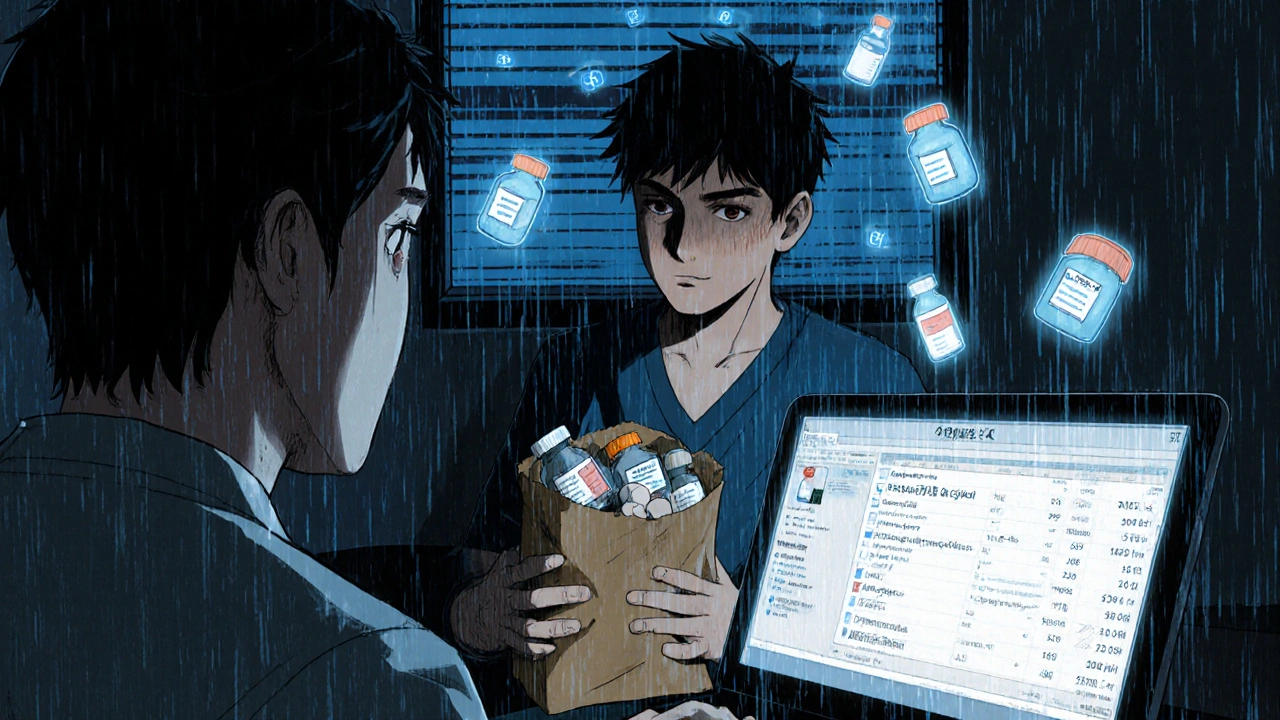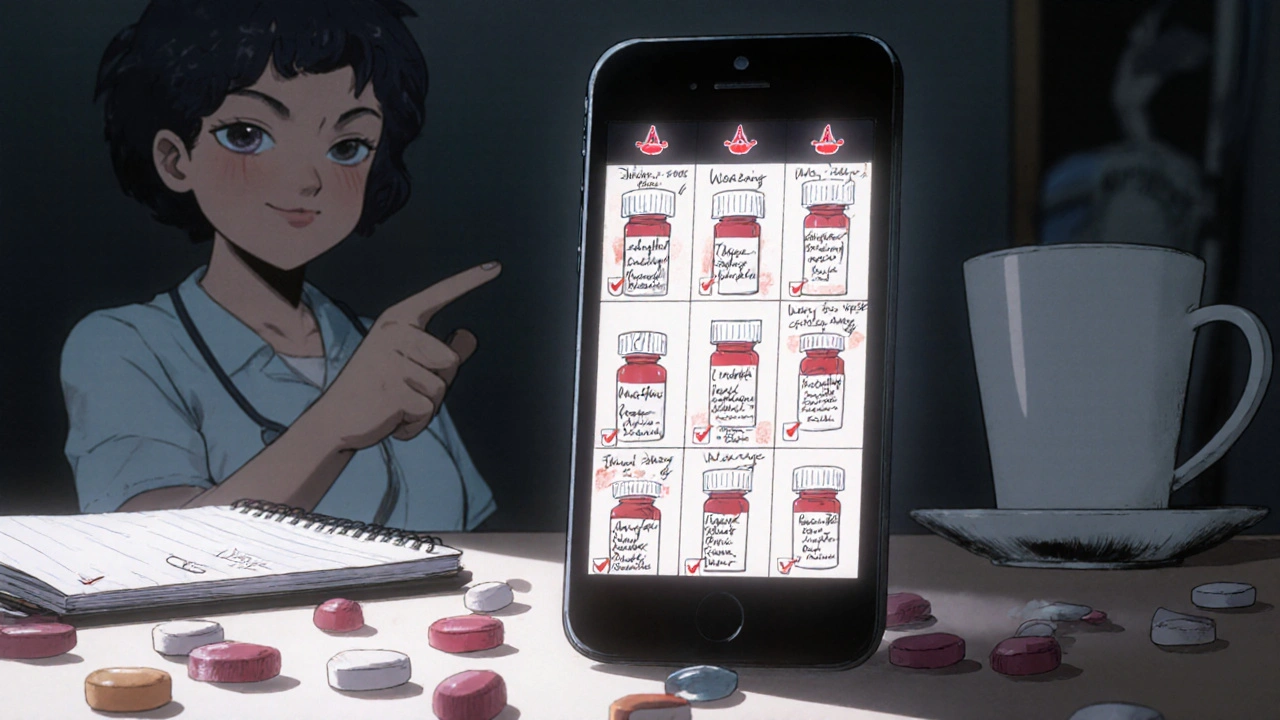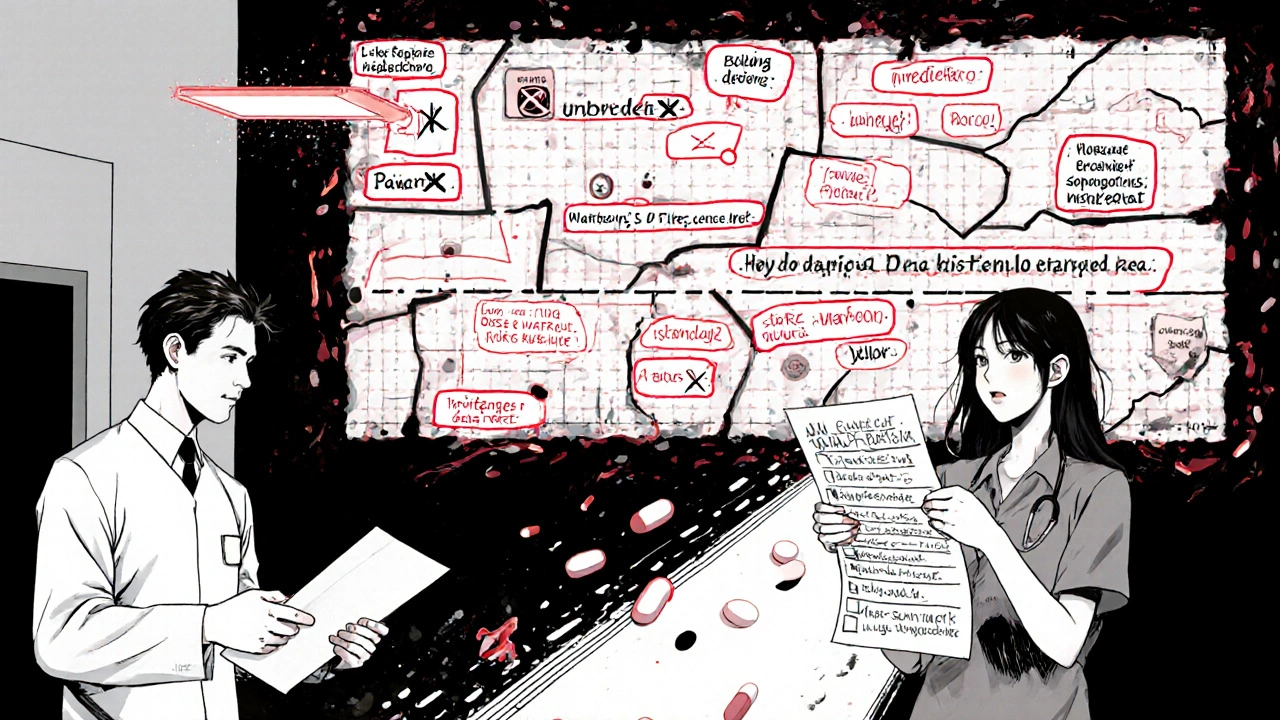Sharing Your Medical History for Safe Medication Decisions
 Nov, 15 2025
Nov, 15 2025
Why Your Medication List Matters More Than You Think
Every year, tens of thousands of people in the U.S. end up in the hospital because of a medication error-many of them preventable. And the biggest cause? Missing or wrong information about what a patient is actually taking. It’s not always a doctor’s mistake. Sometimes, it’s because the patient forgot to mention the ibuprofen they take daily, or the herbal supplement from the health food store, or the blood pressure pill they stopped because it made them dizzy. These small oversights can lead to dangerous drug interactions, allergic reactions, or overdoses.
Medication reconciliation isn’t just a hospital formality. It’s the process of making sure every single medication you’re taking-prescription, over-the-counter, vitamins, supplements-is accurately recorded and reviewed every time you see a new provider, go to the ER, or get discharged from the hospital. When done right, it cuts adverse drug events by 30% to 50%. That’s not a guess. That’s data from the Institute for Healthcare Improvement and the World Health Organization.
What Goes on Your Medication List
Most people think their medication list is just prescriptions. It’s not. A complete list includes:
- All prescription drugs, including dosages and how often you take them
- Over-the-counter medicines like pain relievers, antacids, sleep aids, or allergy pills
- Vitamins, minerals, and herbal supplements (even if you think they’re "natural" and harmless)
- Topical creams, patches, eye drops, or inhalers
- Any medications you stopped taking and why
Here’s the hard truth: 67% of patients don’t accurately report their over-the-counter or supplement use when asked. Why? They don’t think it matters. Or they forget. Or they assume the doctor already knows. But your pharmacist might know better than your doctor-and vice versa. That’s why bringing your actual bottles to appointments, called the "brown bag method," reduces medication errors by 40% compared to just telling your provider what you take.
How Technology Helps (and Where It Falls Short)
Hospitals and clinics now use electronic health records and systems like Surescripts to pull your medication history from pharmacies across the country. In 2024, Surescripts delivered over 3.3 billion medication histories. That sounds impressive. But here’s the catch: these systems still miss about 15% to 20% of medications-especially those bought with cash, from small local pharmacies, or online without a prescription.
Even worse, many patients don’t realize their EHR might show a drug they stopped taking six months ago. Why? Because the pharmacy didn’t update the system, or the doctor didn’t remove it from the list. One study found that relying only on pharmacy claims data leads to inaccurate medication lists 39% of the time. That’s why patient input is still essential. Technology helps, but it doesn’t replace you.
What You Can Do Before Your Appointment
You don’t have to wait for your provider to ask. Take control. Here’s what works:
- Keep a running list on your phone or in a notebook. Update it after every doctor visit, pharmacy refill, or ER trip.
- Take a photo of each pill bottle and note the name, dose, and instructions. Store them in a folder on your phone.
- Bring your actual medications to every appointment. Even if you think you know what’s in them, seeing them helps your provider catch mistakes.
- Write down why you take each one. If you’re not sure, say so. "I take this because my doctor said so" is better than pretending you know.
- Include anything you stopped-and why. "I quit the statin because it gave me muscle pain" gives your provider critical info.
Patients who do this reduce reconciliation time by half. Nurses and doctors notice. And when you walk in with your list, you’re not just a patient-you’re a partner in your own safety.

High-Risk Medications You Need to Flag
Some drugs are more dangerous than others if misused. These are called "high-alert medications" by the Institute for Safe Medication Practices. They include:
- Insulin
- Anticoagulants like warfarin or apixaban
- IV opioids
- Chemotherapy drugs
- IV oxytocin (used in labor)
- High-dose sedatives
If you’re on any of these, make sure your provider knows. Even a small dose error can be life-threatening. For example, a 2022 Johns Hopkins study showed that when hospitals used structured reconciliation for cardiac patients on blood thinners, anticoagulant-related emergencies dropped by 62%. That’s not luck. That’s precision.
What Providers Need to Hear
Doctors aren’t mind readers. They’re juggling multiple patients, charts, alerts, and time limits. But if you give them clear, organized information, they can make better decisions faster. Use simple language:
- "I take metformin 500 mg twice a day for diabetes. I started it in 2022."
- "I take melatonin 3 mg at night because I have trouble sleeping. I’ve been using it for two years."
- "I stopped taking lisinopril because it made me cough. My doctor said it was fine."
- "I take turmeric capsules because I read they help with arthritis."
Don’t say, "I take a bunch of pills." Say exactly what they are. If you’re unsure, say, "I’m not sure what this one is for," instead of guessing. The more specific you are, the less room there is for error.
When Communication Breaks Down
Not every provider listens well. Some are rushed. Others assume the system has it covered. If you feel like your history isn’t being heard, speak up. Say:
- "I’ve had problems before with my meds being missed. Can we go over my list together?"
- "I brought my bottles. Can you check if anything’s missing?"
- "I’m on blood thinners. Can you confirm I’m not getting anything that interacts with them?"
Studies show patients who ask these kinds of questions are 60% more likely to have their medication list corrected before leaving the clinic. You’re not being difficult-you’re being smart.

The Bigger Picture: Why This Isn’t Just About You
Medication errors cost the U.S. healthcare system over $21 billion a year. The National Academy of Medicine predicts that if everyone shared their full medication history accurately, we could prevent 1.2 million adverse drug events by 2030. That’s not just a statistic-it’s people. Parents, grandparents, friends, coworkers. People who didn’t have to die because their doctor didn’t know they were taking St. John’s Wort with their antidepressant.
Every time you update your list, bring your bottles, or ask a question, you’re not just protecting yourself. You’re helping the system work better for everyone.
What Happens If You Don’t Share
Imagine this: You go to the ER with chest pain. You forgot to mention your daily aspirin and the fish oil you take for heart health. The doctor prescribes a blood thinner. Now you’re at risk for internal bleeding. Or you’re admitted for pneumonia. You didn’t tell them about your new thyroid pill. They give you a beta-blocker that makes your heart rate drop dangerously low.
These aren’t hypotheticals. They happen every day. And they’re preventable. The data is clear: when patients share their full history, outcomes improve. When they don’t, the risk spikes.
Final Thought: You’re the Keeper of Your Health
No app, no EHR, no nurse, no doctor can replace you as the main source of truth about your own medications. You know what you took yesterday. You know what made you feel better-or worse. You know which pills you skipped because they were expensive. You know which supplements you started because your cousin swore by them.
That information is gold. Don’t wait for someone to ask. Don’t assume they already know. Write it down. Bring it with you. Ask questions. Be the person who makes sure nothing falls through the cracks. Because when it comes to your health, the most powerful tool you have isn’t a machine. It’s your voice.
Why do I need to tell my doctor about supplements and over-the-counter drugs?
Many supplements and OTC meds can interact dangerously with prescription drugs. For example, St. John’s Wort can reduce the effectiveness of birth control, antidepressants, and blood thinners. Even common painkillers like ibuprofen can raise blood pressure or harm your kidneys if you’re on certain heart or kidney medications. Your provider needs the full picture to avoid harmful interactions.
What if I forget what medicines I’m taking?
Bring your pill bottles to your appointment. Even if the labels are faded, the names and dosages are still there. If you don’t have the bottles, check your pharmacy’s app or website-they usually keep a full history. If you’re still unsure, tell your provider exactly what you remember: "I think I take something for blood pressure, maybe once a day?" That’s better than saying nothing.
Can my doctor see all my prescriptions from other doctors?
Not always. Electronic systems can pull data from major pharmacies and health networks, but they often miss prescriptions from smaller clinics, cash-pay pharmacies, or providers outside your insurance network. That’s why you still need to share your list-even if you think everything’s already in the system.
Is it safe to share my medical history under HIPAA?
Yes. HIPAA allows healthcare providers to share your medical information for treatment purposes without your written consent. That includes sharing your medication list with other doctors involved in your care. Your privacy is protected, and your safety is the priority. If someone refuses to share because of "HIPAA concerns," they’re misinformed.
How often should I update my medication list?
Update it after every change: new prescription, stopped medication, added supplement, or dose change. Even if it’s been only a week. Don’t wait for your next appointment. Keep the list current so it’s always accurate when you need it most-like during an emergency.
Erika Lukacs
November 17, 2025 AT 17:15It’s funny how we treat our bodies like cars-until something breaks, we don’t bother checking the manual. But unlike a car, you can’t just take it to the shop and say, ‘Fix it.’ You’re the mechanic, the fuel, and the owner all at once. And yet, we still treat meds like gossip: ‘Oh, I take this thing, I think?’
Rebekah Kryger
November 19, 2025 AT 07:06Let’s be real-most of this is performative compliance. Doctors don’t have time to parse your ‘brown bag’ of 17 bottles. They scan your chart, see ‘no allergies,’ and move on. The system is designed to ignore you. Your list? It’s a ritual. A comforting superstition. It doesn’t change outcomes. It just makes you feel less guilty.
Victoria Short
November 20, 2025 AT 09:25i just take what the doc says. if i forget something, oh well. they’ve got computers, right? also, i don’t know what half these pills are for. i just know they make the weird feeling go away.
Eric Gregorich
November 22, 2025 AT 05:44Think about it-every time you withhold a supplement, you’re not just risking your life, you’re participating in a quiet, systemic erasure of personal agency. We’ve outsourced our health to algorithms and overworked clinicians who are drowning in checkboxes. Your turmeric capsule? It’s not just a pill. It’s a rebellion. A whisper against the machine that treats your body like a data point. And yet, you’re still expected to be the one who remembers, who organizes, who speaks up-while the system gets paid to ignore you. That’s not healthcare. That’s emotional labor disguised as patient responsibility.
Koltin Hammer
November 22, 2025 AT 19:34I’ve been in hospitals in three countries-India, the U.S., and Canada. The one thing that never changes? The person who brings their meds in a Ziploc bag gets treated like a hero. Not because they’re special, but because 95% of people don’t. I once watched a nurse in Chicago cry because a patient brought a photo of every pill they took since 2018. Not because it was impressive-it was because she’d never seen it before. We’ve made medicine so complex, the simplest act-showing up with your bottles-feels like activism.
Phil Best
November 24, 2025 AT 00:21Oh, so now I’m supposed to be a pharmacy manager, a medical historian, and a therapist for my own body? And if I forget one pill, I’m a dead person waiting to happen? Cool. Let me just add this to my list of unpaid jobs: mom, employee, emotional support human, and now-Medication Compliance Officer. Thanks, capitalism. Also, I’m not bringing my bottles. I’m not even sure where they are. My cat probably ate them.
Parv Trivedi
November 24, 2025 AT 10:28My grandmother in India never kept a list. She knew each pill by color and shape. She knew which one made her feel light, which one made her sleepy. She never saw a doctor for years-just the local herbalist. But when she came to the U.S. and was given ten new pills, she wrote them all down on a piece of paper, with the date and the reason. She didn’t know English well, but she knew her body. We don’t need apps. We need to remember that our bodies speak-if we’re quiet enough to listen.
Willie Randle
November 24, 2025 AT 11:25There’s a reason the article emphasizes specificity: vague statements like ‘I take a bunch of pills’ are statistically correlated with 3x higher risk of adverse events. Precision is not pedantry-it’s survival. If you say ‘I take something for blood pressure,’ you’re not just being unclear-you’re increasing the probability of harm. Your doctor isn’t judging you for forgetting. They’re trying to avoid killing you. Be the person who makes their job easier by being exact. ‘Metformin 500 mg BID.’ Not ‘the diabetes pill.’
Connor Moizer
November 25, 2025 AT 14:15Look, if you’re too lazy to keep a list, that’s on you. But don’t act like it’s the system’s fault. You want to live? Then do the work. Take a damn photo of your bottles. Write it down. Update it. This isn’t hard. It’s not a privilege. It’s basic self-preservation. If you can’t manage your meds, maybe you shouldn’t be managing your life. Stop waiting for someone else to fix your negligence.
kanishetti anusha
November 26, 2025 AT 19:24I used to think supplements were harmless. Then my cousin had a stroke because she took ginkgo with her blood thinner and didn’t tell anyone. She was 32. I now carry a small notebook with every pill, dose, and date. I write why I take it-even if I don’t know. I show it to every new doctor. I don’t care if they roll their eyes. My life isn’t a guess. And if you’re still not sure? Just ask. ‘Is this safe with this?’ That one question saved me twice.
roy bradfield
November 26, 2025 AT 20:40They say ‘your voice matters.’ But what if your voice is ignored? What if your list gets lost in the EHR black hole? What if your pharmacist is the only one who knows you’re on warfarin, but your cardiologist never checks? This whole system is a rigged game. They want you to ‘take responsibility,’ but they don’t give you the tools. They don’t train nurses to verify. They don’t fund systems that talk to each other. They just blame you when you die. And now they want you to bring your bottles? Like it’s a potluck. It’s not empowerment. It’s exploitation dressed as education.